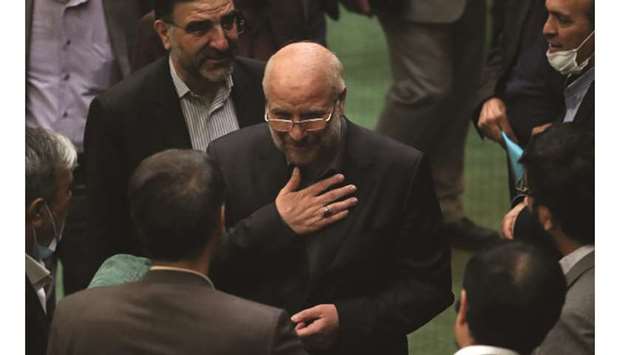Iran’s new parliament yesterday elected former Tehran mayor Mohamed Bagher Ghalibaf as its speaker, consolidating the power of conservatives ahead of next year’s presidential election.
The vote further shifts the political balance toward ultra-conservative opponents of the relatively moderate President Hassan Rouhani at a time Iran is engaged in a bitter standoff with arch foe the United States.
State television said the 58-year-old Ghalibaf — also a former national police chief and ex-commander of the Revolutionary Guards’ air force — won 230 of the 267 votes cast to secure one of the most influential positions in the Islamic republic. Bespectacled, balding and wearing a dark suit, Ghalibaf accepted congratulations from MPs, then moved towards the speaker’s seat with a smile and told the chamber: “I thank God for being given a chance to serve the people.”
Ghalibaf is a three-time presidential candidate who served as Tehran mayor from 2005 to 2017. In the vote for the speaker post, he roundly defeated conservative lawmakers Fereydoun Abbasi and Mostafa Mirsalim who garnered 17 and 12 votes respectively.
Ghalibaf also received the most votes from the capital in Iran’s February 21 parliamentary election, which saw the lowest turnout in decades. The record abstention was partly over the disqualification of many moderate and reformist candidates by the Guardian Council.
An alliance of “principalists” — or conservatives — and ultra-conservatives swept the election in the absence of any challenge from the reformist side.
As a result, parliament is now dominated by ultra-conservatives who opposed Rouhani on almost all issues, from dealing with the United States to running the sanctions-hit economy and containing the region’s deadliest coronavirus outbreak. The health ministry says the virus has killed 7,564 people out of 141,591 confirmed cases of infection since Iran reported its first fatalities on February 19.
The parliament, which substantially shapes political debate in Iran, had been closed for six weeks until April 7 as part of measures aiming to curb the spread of the novel coronavirus. Of the 279 MPs elected in February, two died of the virus and nine were disqualified by the outgoing parliament.
Iran is scheduled to hold a presidential poll in around 12 months when Rouhani’s second and final term ends.
Ghalibaf had unsuccessfully challenged Rouhani’s first bid for the presidency and dropped out of the 2017 election to support Ebrahim Raisi, who now serves as Iran’s judiciary chief. Yesterday’s vote saw Ghalibaf succeed Ali Larijani, who had held the speaker post since 2008.
Supreme leader Ayatollah Ali Khamenei appointed the outgoing Larijani as his adviser and a member of the Expediency Discernment Council, a body set up to settle disputes between the parliament and the Guardian Council, state television said. Larijani also congratulated Ghalibaf in a statement and said he had been a “hardworking manager of the system in different positions”.
The speaker not only directs the parliament’s affairs but also has a seat at the High Council of Economic Co-ordination alongside the president and judiciary chief. Established in 2018 by the supreme leader’s decree, the Council is the highest authority on economic affairs and is meant to combat the impact of US sanctions imposed on Iran.
US President Donald Trump withdrew from a landmark nuclear agreement and reimposed sanctions on Iran in 2018, mainly targeting the crucial oil and banking sectors.
Decades-old tensions between Iran and the United States have soared since then, with the two sworn enemies coming to the brink of confrontation on at least two occasions in the past year.

Iranian Mohamed Bagher Ghalibaf (centre) stands among members of the parliament after being elected as parliament speaker at the Iranian parliament in Tehran yesterday.
